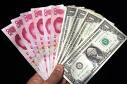 My life is complicated and one of the complication is I have to deal with two currencies: my investment income and most business income are received in dollar, whilst 95% of my cost structure is denominated in Chinese Yuan (or called Renminbi -- "people's money"). Worse, Yuan is appreciating quicker and quicker against the dollar.
My life is complicated and one of the complication is I have to deal with two currencies: my investment income and most business income are received in dollar, whilst 95% of my cost structure is denominated in Chinese Yuan (or called Renminbi -- "people's money"). Worse, Yuan is appreciating quicker and quicker against the dollar.
In the past year, I managed to book an annualized rate of return of 8.77% in my self-managed portfolio, but this just barely beat the Yuan's 6.9% appreciation against the dollar in the year. So I asked myself the question in December, should I just buy some money market fund in China for safe return instead of risking my principal in the U.S. equity market?
As the first step, I moved $50,000 to China and bought a load of money market funds here. While I'm still contemplating the magnitude and timing I should continue to do this, here is a quick step-by-step process of how to do the Dollar/Yuan carry trade for those who want to try:
Step 1: Open A Banking Account in China
Everyone with an identification card (for local people) or valid passport (for foreigners) can open an account at any banks in China. Reputable domestic banks in China includes Bank of China, Bank of Communications, ICBC and China Merchants Bank, the latter is what I use primarily. Foreign owned banks like Citibank and HSBC also have branches in major cities in China. One will need to open a Renminbi account and an US Dollar account. It is worthwhile to set up e-banking in your first visit too (it won't be automatically set) because the long queues at major banks can sometimes keep you waiting for hours.
Step 2: Wire Your Money to China
When you open your account, ask for foreign wire transfer instructions. Typically the instruction includes a SWIFT code for the bank (or a particular branch of the bank) and sometime a corresponding bank's information.
You may take this to your bank in the States, and ask for an international wire transfer to your China account. Usually the processing fee is about $20-$50.
The shortcut I found is to keep more than $100,000 invested in TD Ameritrade to be eligible for fee-free international wire -- all I need to do is to fax a form to TD Ameritrade when I need to move the money. TD Ameritrade also has fee-free ACH service so you can siphon the money off your other banking accounts.
Step 3: Convert Your Dollar to Yuan
You will receive the international wire in dollars, so you need to convert that to Yuan. You may only do the currency conversion during banking hours on weekdays when the domestic regulated foreign exchange market is open. If you have set up e-banking, you can do this from your computer.
Now this is certain limitation: to avoid the overflow of "hot money", one individual (identified by legal ID number) can only convert up to US$50,000 in one year (either to or from Renminbi). This does not mean you cannot bypass the rule by asking your trusted friends or relatives to make the conversion in their accounts.
Step 4: Determine the Right Investment
The financial system still being tightly managed, the central bank sets and enforces the deposit rates for all checking and CD accounts. Therefore, one does not have to do comparison shopping to get the best savings rate if you want to park your money with the bank -- you will get the identical interest rate on checking and CD accounts at any banks on the street.
As of today, the rates are:
Checking: 0.72%
3-month CD: 3.33%
6-month CD: 3.78%
1-year CD: 4.14%
2-year CD: 4.68%
3-year CD: 5.40%
5-year CD: 5.85%
A more liquid but safe alternative is money market fund, which typically yields 3.0-3.5% these days. One can usually have access to cash within 1-2 days of redemption. Given the central banking has hiked the rates by six times in 2007, and the market is still expecting more rate increases in 2008, it is probably worthwhile to sacrifice some interest for more liquidity.
Now you are not limited to these safest vehicles. There are a full spectrum of Renminbi-denominated investments one can commit his cash to, ranging from mutual funds, stocks, real estates, or precious metals (do you know Chinese has a fetish for gold?).
For those of you who cannot physically open an account in China, the (much inferior) alternative will be Everbank's foreign currency products. You can still convert your dollars to Renminbi and hope Yuan will continue its appreciation against the dollar. The only caveat: Everbank gives zero interest on your Renminbi deposit.
Questions?
